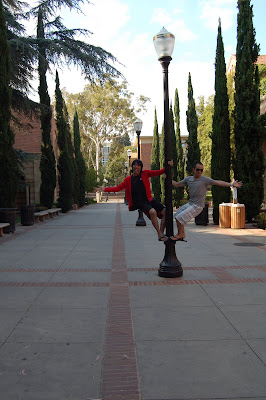It was out of nonchalance that I decided to move in to the so-called Ministry House almost a year ago. Since then, I can confidently declare that the hasty decision is one of the life-changing decisions that I've ever made. It almost seems audacious to make such claim; that moving into a house of six could actually be such substantial, but here I am, sharing a tip of the iceberg of my experiences and elucidating why there is not even a hint of audacity on such claim but rather a very natural one.
Allow me to make a very circular argument by first stating that humans are not designed to be self-autonomous. In fact, we are hard-wired to be in a community, in a fellowship of self-giving and other-centeredness. To take a simple example, Christopher McCandless, an American adventurer, who has been living in solitude and an off-civilization life for three months, came to a realization of how unreal that kind of life was. On his last journal, he noted that "happiness is real only when shared".
That quote hit me hard. To some degree, I can identify with Christopher McCandless. I may not be fearless enough to go to live in Alaska, but once I dreamed of a secluded and solitary life for my retirement, far from the hustling and bustling of city life and friends or neighbors who constantly impose disturbances. Ministry house, in all its simplicity, debunks that belief; the virtue of independence that once I highly regard is now the object of of my derision.
Our God is a relational and communal God and since we are created in His image, we share those characteristics. Living with six brothers allows me to taste the sweetness of being in an other-centered fellowship and foretaste the beauty of heaven. Borrowing Tim Keller's image of divine love, in other centeredness love, "we enter into a dynamic orbit around him or her, we center on the interests and desires of the other". When six people revolve around one another with love, "that creates a dynamic, pulsating dance of joy and love." When I have been exposed to this higher standard, the idea of a solitary life seems too preposterous.
For example, when I was still doing my undergrad study, I voluntarily packed my schedule with back to back classes, sometimes even up to 9.30pm. Why? Because I draw my significance from the sense of accomplishment of achieving something beneficial that day, I bask in the glory of being effective and useful. However, the glory was short-lived. Once the satisfaction waned, I felt like there was something missing. The satisfaction could not fill a deeper void in my heart. My response, surprisingly, was incredulous; Instead of admitting that there's a problem to be fixed, I brushed it off and look forward to achieve something more tomorrow - more readings, more writings, more working out, etc.
Apparently, I was living out my individualistic lifestyle while striving forward to effectively achieve my goals and my sense of significance. On the outset, isn't this what all the business books adamantly preach - isn't this good - what's wrong with this picture? Ministry house helps me to see the answer, and it was found in each individual in the house. All of this while, I did not live up to my identity as a relational human being and voluntarily cut myself off from developing a close relationship with friends and brothers in the house.
However, living in the house where territory is undefined and all rooms are common areas, it is impossible to keep anyone at arm's length. People will come to my room to share and talk. I still remember several occasions where this happened; one or two people gathered together in the living room or anywhere, the conversation began to draw more people and it actually led to a very invigorating late-night conversation. The same thing goes to our weekly prayer meeting; I witness the fellowship of brothers in which people share their struggle, confess their sins, encourage one another - the conversation was just soaked with love.
Having experienced this, it is illogical to deny that a brotherly fellowship is much more satisfying and fulfilling. It helps me to have a closer and deeper relationships, it provides me with opportunities to practice God's love, and it gives me a fulfilling life. A life of love and being loved. Serve and being served. A life in which you can rest your head at night, and smile widely and gratefully just at the thought of how life can be so beautiful. A life with God.
 Just like these people, there were also many occurrences in my life where I doubt his wisdom. During my four months of job-search, I doubted whether he was in control over my predicament; I wondered if he accidentally overlooked my case and left me 'home-alone'. I doubted his sovereignty when he gave me the not-so-popular job in sales. I doubted if he understood me and had my best interest at heart when my job was being taken away from me. Sometimes I see myself as a puppet being controlled aimlessly by the puppet master, and when situation does not go as my script perceives, I second-guess his wisdom "Do you know what you're doing? You don't know what it's like down here!"
Just like these people, there were also many occurrences in my life where I doubt his wisdom. During my four months of job-search, I doubted whether he was in control over my predicament; I wondered if he accidentally overlooked my case and left me 'home-alone'. I doubted his sovereignty when he gave me the not-so-popular job in sales. I doubted if he understood me and had my best interest at heart when my job was being taken away from me. Sometimes I see myself as a puppet being controlled aimlessly by the puppet master, and when situation does not go as my script perceives, I second-guess his wisdom "Do you know what you're doing? You don't know what it's like down here!" And that is how Christmas provides solution for each of my ordeal; Christmas is the ultimate answer. I may not grasp his mysterious plan in my life yet, the future is still clouded with uncertainties and I will still waver in my unbelief and vacillate like a faithless child. But as I revisit the story of Christmas, I realize that the Father who sent his begotten son to ill-deserving people such as me is still the same Father who loves me today with the same love that put Jesus in a small manger as well as on the cross.
And that is how Christmas provides solution for each of my ordeal; Christmas is the ultimate answer. I may not grasp his mysterious plan in my life yet, the future is still clouded with uncertainties and I will still waver in my unbelief and vacillate like a faithless child. But as I revisit the story of Christmas, I realize that the Father who sent his begotten son to ill-deserving people such as me is still the same Father who loves me today with the same love that put Jesus in a small manger as well as on the cross. 







































.png)


